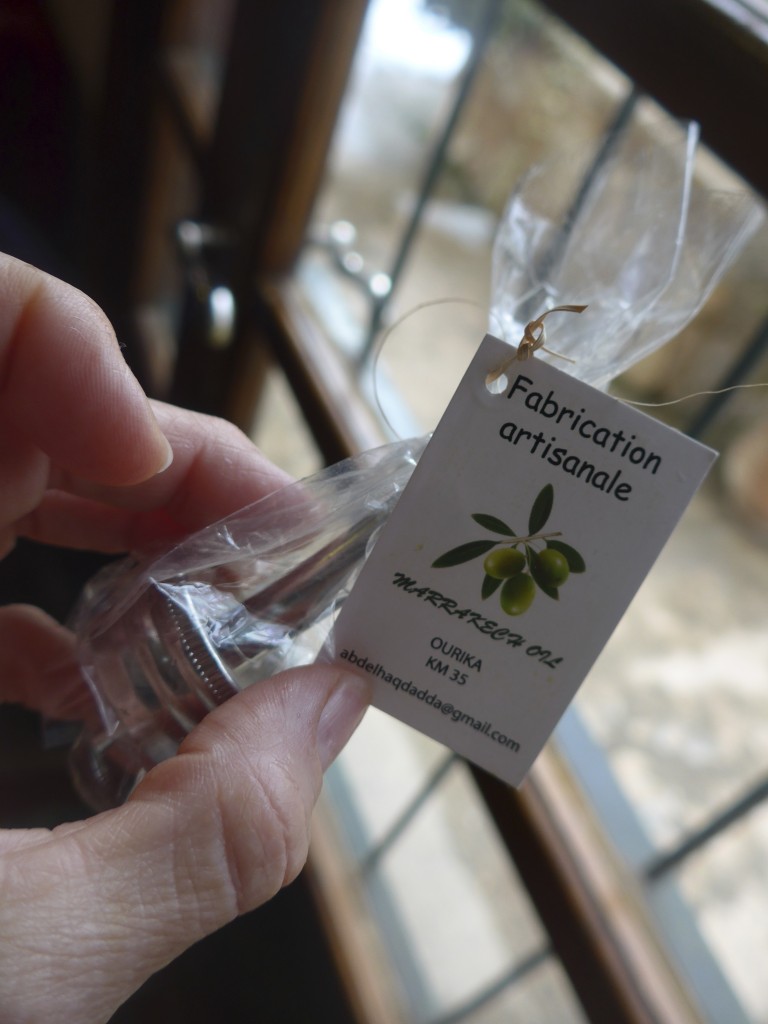We had stopped by La clé de huile the afternoon we arrived in Ourika, but it was closed. A housekeeper came out to tell us the boss was in Marrakesh but would be back tomorrow, so we said we’d come by about 10 a.m. We arrived to find the gate once again closed, but we banged on the door and eventually a man came out. “No,” he said, “the museum is closed.” “Dommage,” said James: polite French for “Bummer.” He points out, gently that we came yesterday and were told it would be open this morning. “Ah, oui,” says the man. “Elle m’a dit.” The housekeeper told me. You can come in. He swung open the gates and let us in, not only to the museum, but to his day, a small slice of his life. We started in the museum, full of informative posters about the history of olive oil production, both in Morocco and around the world: 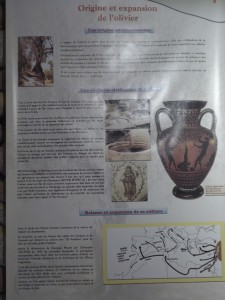
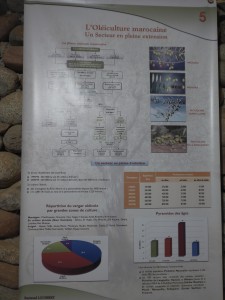 There was also an old Roman-era grinding stone,
There was also an old Roman-era grinding stone, 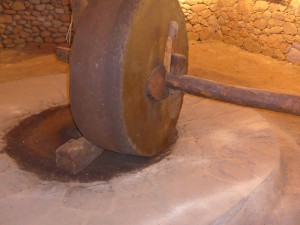 plus an example of an ancient oil press, with technology even more “beldi” or traditional than what we saw outside Demnate:
plus an example of an ancient oil press, with technology even more “beldi” or traditional than what we saw outside Demnate: 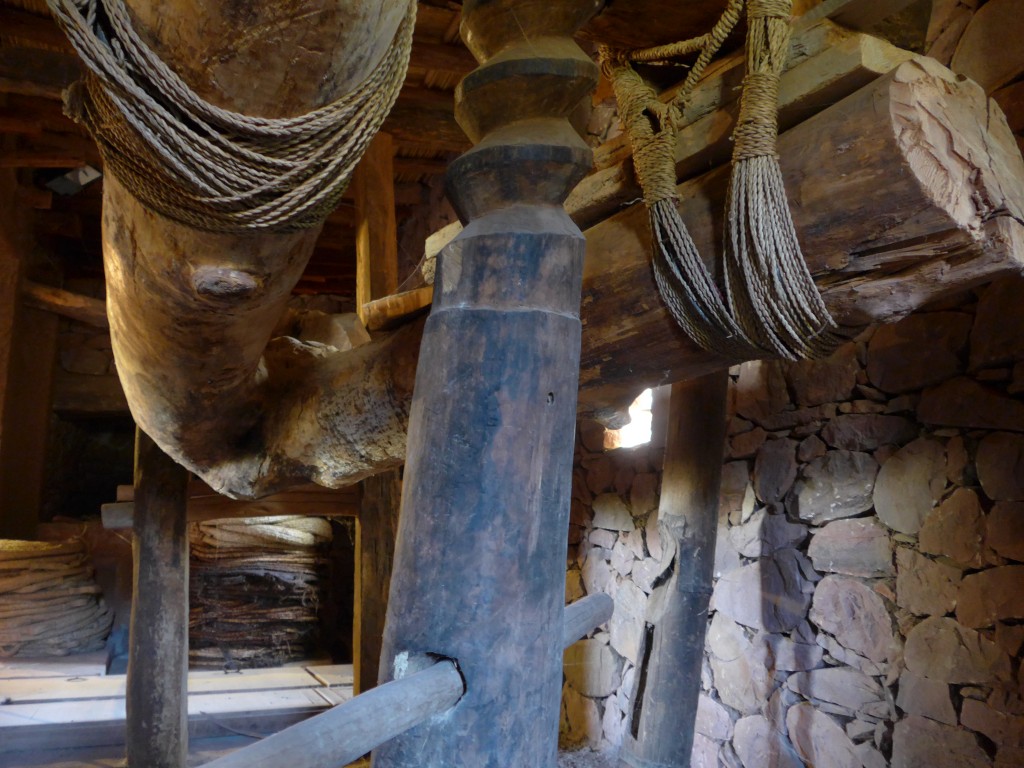 And here you can see a little more clearly the bags that are filled with crushed olives in order to be pressed:
And here you can see a little more clearly the bags that are filled with crushed olives in order to be pressed: 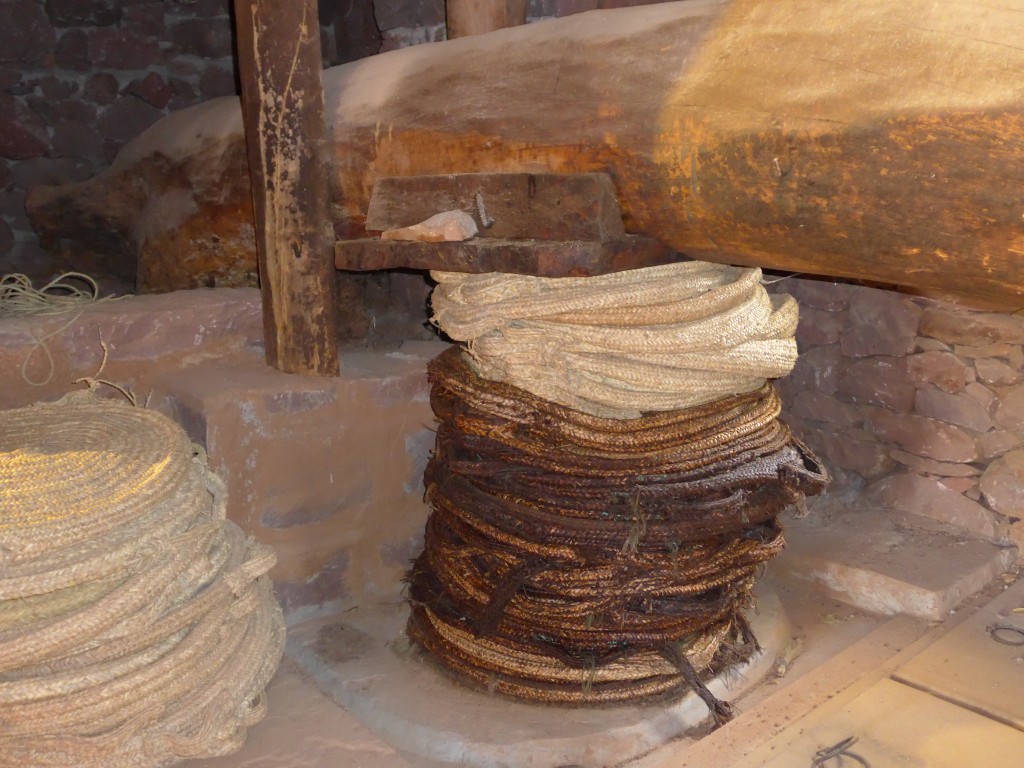 The metal press (outside Demnate) certainly seemed easier and less dangerous to run! But the museum was just the beginning. We went out into the olive grove, to see people harvesting the olives with a hydraulic rake:
The metal press (outside Demnate) certainly seemed easier and less dangerous to run! But the museum was just the beginning. We went out into the olive grove, to see people harvesting the olives with a hydraulic rake: 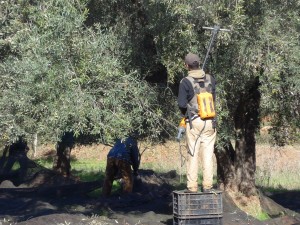 The yellow battery pack will run for the best part of a day; the prongs of the rake swing back and forth, shaking olives out of the trees. People on the ground gather up the fallen olives:
The yellow battery pack will run for the best part of a day; the prongs of the rake swing back and forth, shaking olives out of the trees. People on the ground gather up the fallen olives: 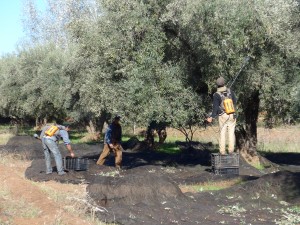
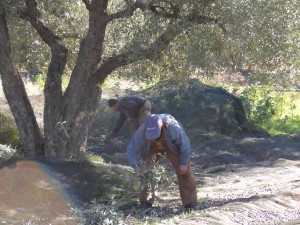 Under trees that have already been harvested, a small group of women gather up individual olives, gleaning in a traditional way.
Under trees that have already been harvested, a small group of women gather up individual olives, gleaning in a traditional way. 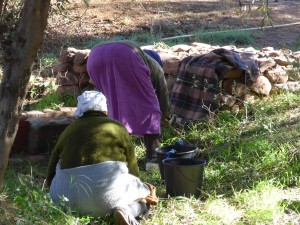 The workers are paid 20 dirhams–about $2.50–per container of olives. This is a little over the odds: our host didn’t want any trouble or argumentation over hours or labor. (Nancy points out that this is also more than the minimum cash wage for tip employees in the U.S.) Nancy asks about pests and spraying, and indeed the trees are sprayed twice a year, first to prevent the growth of a particular fungus, Verticillium wilt, and then to limit the attacks of the olive fly. Abdelhaq manages La Clé des Huiles for a French patron: a lawyer who has been involved in politics on a national scale, associated somehow with a prominent lawyer who recently committed suicide. The patron had originally planned a large retreat center, where everything would be available on-site. There are separate houses and apartments dotted about the property, a swimming pool, a massive professional kitchen and dining hall. The place is beautiful: as we walk around the property, we can imagine how fabulous it would be to stay here. But everything is shut, in limbo. The aging patron, focused on his own troubles in France, wanted to fire all the workmen in the middle of Ramadan two summers ago. Abdelhaq told him he could not do that–it would be unethical. He tried to broker an agreement by which the 18 workmen would each work one-third time for the month of Ramadan so that everyone could have at least enough to support their families, but the workmen refused and all went on strike together. What a misery, to be attacked on all sides. The owner has now passed decision-making power to his son, who wants to sell the property. Our friend was hoping that a friend of this son would help him negotiate a means of taking the property forward.
The workers are paid 20 dirhams–about $2.50–per container of olives. This is a little over the odds: our host didn’t want any trouble or argumentation over hours or labor. (Nancy points out that this is also more than the minimum cash wage for tip employees in the U.S.) Nancy asks about pests and spraying, and indeed the trees are sprayed twice a year, first to prevent the growth of a particular fungus, Verticillium wilt, and then to limit the attacks of the olive fly. Abdelhaq manages La Clé des Huiles for a French patron: a lawyer who has been involved in politics on a national scale, associated somehow with a prominent lawyer who recently committed suicide. The patron had originally planned a large retreat center, where everything would be available on-site. There are separate houses and apartments dotted about the property, a swimming pool, a massive professional kitchen and dining hall. The place is beautiful: as we walk around the property, we can imagine how fabulous it would be to stay here. But everything is shut, in limbo. The aging patron, focused on his own troubles in France, wanted to fire all the workmen in the middle of Ramadan two summers ago. Abdelhaq told him he could not do that–it would be unethical. He tried to broker an agreement by which the 18 workmen would each work one-third time for the month of Ramadan so that everyone could have at least enough to support their families, but the workmen refused and all went on strike together. What a misery, to be attacked on all sides. The owner has now passed decision-making power to his son, who wants to sell the property. Our friend was hoping that a friend of this son would help him negotiate a means of taking the property forward. 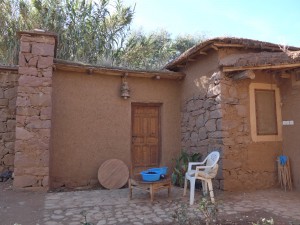 After our tour, we pulled up chairs in the courtyard of the living and office space, moved the buckets of olives off the table, and feasted on mint tea, olives, beldi olive oil, and warm fresh bread. We tried to offer Abdelhaq at least the listed admission fee for the museum, but he would have none of it. We asked to see his store, up on the main road, where we tried to buy enough products to compensate in some small way for the time he had spent with us–and he kept knocking down the price as a gesture of friendship. He set us on the road again, loaded with special honey, preserves, limited edition olive oil–and a plastic water bottle filled with fresh beldi olive oil. We think of Abdelhaq every day as we dip our crusty bread in that delicious, warming, filling fare.
After our tour, we pulled up chairs in the courtyard of the living and office space, moved the buckets of olives off the table, and feasted on mint tea, olives, beldi olive oil, and warm fresh bread. We tried to offer Abdelhaq at least the listed admission fee for the museum, but he would have none of it. We asked to see his store, up on the main road, where we tried to buy enough products to compensate in some small way for the time he had spent with us–and he kept knocking down the price as a gesture of friendship. He set us on the road again, loaded with special honey, preserves, limited edition olive oil–and a plastic water bottle filled with fresh beldi olive oil. We think of Abdelhaq every day as we dip our crusty bread in that delicious, warming, filling fare. 